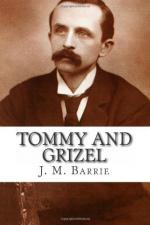“Not you,” said Tommy, quickly; “a chemist has a steady hand.”
“Confound you!” cried Pym, “what sort of a boy is this?”
“If you had been the draper you would have wiped the drink off your gown,” continued Tommy, thoughtfully, “and if you had been ’Glasgow Man’ you would have sucked it off, and if you had been the charitable society you wouldn’t swear in company.” He flung out his hand. “I’ll tell you who you are,” he said sternly, “you’re ‘Anon.’”
Under this broadside Pym succumbed. He sat down feebly. “Right,” he said, with a humourous groan, “and I shall tell you who you are. I am afraid you are my amanuensis!”
Tommy immediately whistled, a louder and more glorious note than before.
“Don’t be so cocky,” cried Pym, in sudden rebellion. “You are only my amanuensis if you can tell me what that is. If you can’t—out you go!”
He had him at last! Not he!
“An amanuensis,” said Tommy, calmly, “is one who writes to dictation. Am I to bring in my box? It’s at the door.”
This made Pym sit down again. “You didn’t know what an amanuensis was when you answered my advertisement,” he said.
“As soon as I got to London,” Tommy answered, “I went into a bookseller’s shop, pretending I wanted to buy a dictionary, and I looked the word up.”
“Bring in your box,” Pym said, with a groan.
But it was now Tommy’s turn to hesitate. “Have you noticed,” he asked awkwardly, “that I sometimes whistle?”
“Don’t tell me,” said Pym, “that you have a dog out there.”
“It’s not a dog,” Tommy replied cautiously.
Pym had resumed his seat at the table and was once more toying with his pen. “Open the door,” he commanded, “and let me see what you have brought with you.”
Tommy obeyed gingerly, and then Pym gaped, for what the open door revealed to him was a tiny roped box with a girl of twelve sitting on it. She was dressed in some dull-coloured wincey, and looked cold and patient and lonely, and as she saw the big man staring at her she struggled in alarm to her feet, and could scarce stand on them. Tommy was looking apprehensively from her to Pym.
“Good God, boy!” roared Pym, “are you married?”
“No,” cried Tommy, in agony, “she’s my sister, and we’re orphans, and did you think I could have the heart to leave Elspeth behind?” He took her stoutly by the hand.
“And he never will marry,” said little Elspeth, almost fiercely; “will you, Tommy?”
“Never!” said Tommy, patting her and glaring at Pym.
But Pym would not have it. “Married!” he shouted. “Magnificent!” And he dipped exultantly, for he had got his idea at last. Forgetting even that he had an amanuensis, he wrote on and on and on.
“He smells o’ drink,” Elspeth whispered.
“All the better,” replied Tommy, cheerily. “Make yourself at home, Elspeth; he’s the kind I can manage. Was there ever a kind I couldna manage?” he whispered, top-heavy with conceit.




